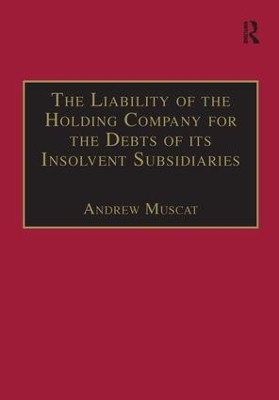
The Liability of the Holding Company for the Debts of its Insolvent Subsidiaries
Seiten
2016
Routledge (Verlag)
978-1-138-27678-9 (ISBN)
Routledge (Verlag)
978-1-138-27678-9 (ISBN)
This work deals with the liability of the holding company for the debts of its insolvent subsidiaries. In analysing the current position under English law, the work challenges as outmoded and inadequate the virtual dogma that a holding company is not answerable for the debts of its insolvent subsidiaries.
This work deals with the liability of the holding company for the debts of its insolvent subsidiaries. In analyzing the current position under English law, the work challenges as outmoded and inadequate the virtual dogma that a holding company is not answerable for the debts of its insolvent subsidiaries. The study identifies four separate and distinct types of behavioural practices within corporate groups which may prejudice the interests of external creditors or otherwise constitute an abuse of the corporate form; the subservient subsidiary situation; the inadequately financed subsidiary situation; the integrated economic enterprise situation; and the group persona situation. After weighing the various arguments for and against a change in the law and concluding that reform is called for, the study proceeds to submit some radical proposals for reform. The basic thrust of the reform proposals is that in a number of well-defined situations entity law should give way to an enterprise analysis and holding company liability should be imposed for the debts of insolvent subsidiaries.
This work deals with the liability of the holding company for the debts of its insolvent subsidiaries. In analyzing the current position under English law, the work challenges as outmoded and inadequate the virtual dogma that a holding company is not answerable for the debts of its insolvent subsidiaries. The study identifies four separate and distinct types of behavioural practices within corporate groups which may prejudice the interests of external creditors or otherwise constitute an abuse of the corporate form; the subservient subsidiary situation; the inadequately financed subsidiary situation; the integrated economic enterprise situation; and the group persona situation. After weighing the various arguments for and against a change in the law and concluding that reform is called for, the study proceeds to submit some radical proposals for reform. The basic thrust of the reform proposals is that in a number of well-defined situations entity law should give way to an enterprise analysis and holding company liability should be imposed for the debts of insolvent subsidiaries.
Andrew Muscat
Contents: Introduction; The Corporate Group - Risks of Abuse and Unfairness in Certain Behavioural Practices; The Relevance of Ordinary Principles to the Question of Inter-Corporate Liability; Policy Objectives and the Corporate Group; The Subservient Subsidiary Situation; The Undercapitalised Subsidiary Situation; The Integrated Economic Enterprise Situation; The Group Persona Situation; Common Issues; Conclusion.
| Erscheinungsdatum | 19.11.2016 |
|---|---|
| Verlagsort | London |
| Sprache | englisch |
| Maße | 153 x 219 mm |
| Gewicht | 453 g |
| Themenwelt | Recht / Steuern ► EU / Internationales Recht |
| Recht / Steuern ► Wirtschaftsrecht ► Bank- und Kapitalmarktrecht | |
| Recht / Steuern ► Wirtschaftsrecht ► Gesellschaftsrecht | |
| ISBN-10 | 1-138-27678-2 / 1138276782 |
| ISBN-13 | 978-1-138-27678-9 / 9781138276789 |
| Zustand | Neuware |
| Haben Sie eine Frage zum Produkt? |
Mehr entdecken
aus dem Bereich
aus dem Bereich
Buch | Softcover (2024)
Springer Gabler (Verlag)
CHF 34,95
Einkommensteuer, Körperschaftsteuer, Gewerbesteuer, Bewertungsgesetz …
Buch (2024)
Springer Gabler (Verlag)
CHF 39,15


